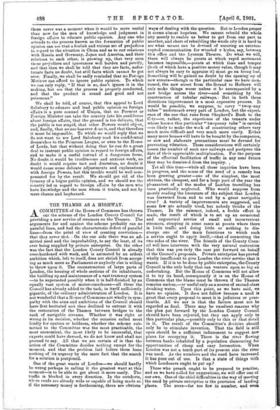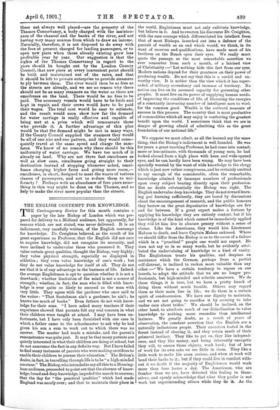THE THAMES AS A HIGHWAY.
ACOMMITTEE of the House of Commons has thrown out the scheme of the London County Council for providing a new service of steamers on the Thames. The arguments for and against the scheme probably ran on parallel lines, and had the characteristic defect of parallel lines—from the point of view of creating conviction— that they never met. . On the one side there was an ad- mitted need and the improbability, to say the least, of its ever being supplied by private enterprise. On the other was the fact that the London County Council is already over-burdened with work, and is animated by an ardent ambition which, left to itself, does not shrink from accept- ing as much more as Parliament or anybody else is willing' to throw upon it. The reconstruction of large parts of London, the housing of whole sections of its inhabitants, the building up and maintenance of a vast tramway system —to be superseded possibly when it is half-finished by an equally vast system of motor-omnibuses—all these the Couucil has already added to the task, in itself sufficiently gigantic, of the ordinary administration of London. It is not wonderful that a House of Commons not wholly in sym- pathy with the aims and ambitions of the Council should have first hesitated and then declined to entrust. it with the restoration of the Thames between bridges to the rank of navigable streams. Whether it was right or wrong in its decision, whether the occasion called most loudly, for caution or boldness, whether the scheme sub- mitted to the Committee was the most practicable, the most economical, the most likely to be successful, that experts could have devised, we do not know and shall not pretend to say. All that we are certain of is that the action of the Committee decides nothing except for the moment, and that the problem laid before them loses nothing of its urgency by the mere fact that the search for a solution is postponed.
One of the great. wants of London—we should hardly be wrong perhaps in calling it the greatest want at this moment—is to be able to get about it more easily. The traffic is blocked in every direction. In the outskirts, where roads are already wide or capable of being made so if the necessary money is forthcoming, there are obvious ways of dealing with the question. But in London proper it seems almost hopeless. We cannot rebuild the whole city merely to enable us better to get from one part to another, and short of rebuilding the whole city it is hard to see what means can be devised of securing an uninter- rupted communication for wheeled v. hicks, say, between this office and the Lyceum Theatre. Do what we will, there will always be points at which rapid movement becomes impossible,—points at which time and temper (both of which have a positive money value, though it may not always be easy to appraise it) must go on being lost. Something will be.gained no doubt by the opening up of new streets—though in the particular case we have men- tioned, the new street from the Strand to Holborn will only make things worse unless it be accompanied by a new bridge across the river—and something by the construction of tubular railways.. But in both these directions improvement is a most expensive process. It would be possible, we suppose, to carry " twop nny tubes" underneath every part of London, but the experi- ence of the one that runs from 8hepherd's Bush to the City—or, rather, the experience of the tenants under whose houses this particular "twopenny tube" is carried. —is likely to make the work of constructing others very much more difficult and very much more costly. Either many more houses will have to be bought by the companies, or new and elaborate precautions must be devised for preventing vibration. These considerations will certainly lessen the number of such new railways and postpone the date of their appreciable multiplication. For the purpose of the effectual facilitation of traffic in any near future they may be dismissed from the inquiry. , Yet all this time—while all these inquiries have been in progress, and the sense of the need of a remedy has been growing greater—one of the simplest, the most obvious, the cheapest, and for a large part of the year the • pleasantest of all the modes of London travelling has been practically neglected. Who would suppose from merely reading the literature of the subject that'London was traversed from end to end by a great navigable river ? A variety of improvements are suggested, and some few are actually tried, but nobody thinks Of the Thames. In the summer, indeed, a feeble effort is made, the result of which is to set up an occasional and. unpunctual service of small and inconvenient steamers, stopping in some cases at points where there is little traffic and doing little or nothing to dis- charge one of the main functions to which such a service ought to apply itself,—that of connecting the two sides of the river. The friends of the County Coun- cil will here intervene with the very natural contention that this was pre,-isely the case put forward on behalf of the Council's proposals. Private enterprise has proved wholly insufficient to give London the river service that it wants. If it is to be done by public enterprise, the County Council is the only body that can venture upon so big an undertaking. But the House of Commons will not allow it to try its hand, consequently it is on the House of Commons that the blame must be thrown if the Thames remains useless,—or useful only as a source of second-class drinking water. Upon this point, as we have said,, we have no opinion. It does not follow because a need is great that every proposal to meet it is judicious or prac- ticable. All we say is that the failure must not be regarded as final. There may be excellent reasons why the plan put forward by the London County Council should have been rejected, but they can apply wily to this particular plan,—possibly only to this or that detail in it. The result of the Committee's decision should only be to stimulate invention. That the field is still open should be a sufficient inducement to suggest new plans for occupying it. There is the river flowing between banks inhabited by a population clamouring for opportunities of cheap and easy locomotion. When London was not a tenth part of its present size the river was used.. As the numbers and the need have increased. it has gone out of use. Is that a state of things with which Londoners ought to put up ?.
Those who preach ought to be prepared to practise, and as we have called for suggestions, we will offer one of our own. One of the chief difficulties in the way of meeting the need by private enterprise is the provision of landing places. The piers—far too few in number, and eves
these not always well placed—are the property of the Thames Conservancy, a body charged with the mainten- ance of the channel and the banks of the river, and not having very many sources from which to draw an income. Naturally, therefore, it is not disposed to do away with the fees at present charged for landing passengers, or to open new piers when those already existing grow less profitable year by year. Our suggestion is that the rights of the Thames Conservancy in regard to the piers should be bought out by the London County Council, that new piers at every convenient point should be built and maintained out of the rates, and that it should be left to private enterprise to provide steamers to ply between them. The river would then be as free as the streets are already, and we see no reason why there should not be as many steamers on the water as there are omnibuses on the land. There would be no fees to be paid. The necessary vessels would have to be built and kept in repair, and their crews would have to be paid their wages. The total cost would be easy to estimate, and the result would soon show how far the demand for water carriage is really effective and capable of being met at a price which will remunerate those who provide it. A further advantage of this plan would be that the demand might be met in many ways. If the County Council supplied the steamers they would be all of one size and one pattern, and they would conse- quently travel at the same speed and charge the same fares. We know of no reason why there should be this uniformity of water carriage. We have too much of it already on land. Why are not there fast omnibuses as well as slow ones, omnibuses going straight to their destination instead of stopping whenever asked, omni- buses charging higher fares and giving more room,— omnibuses, in short, designed to meet the wants of various classes of passengers, and not to reduce them to uni- formity ? Perhaps with an abundance of free piers some- thing in this way might be done on the Thames, and so help to make the river more popular than the streets.







































 Previous page
Previous page